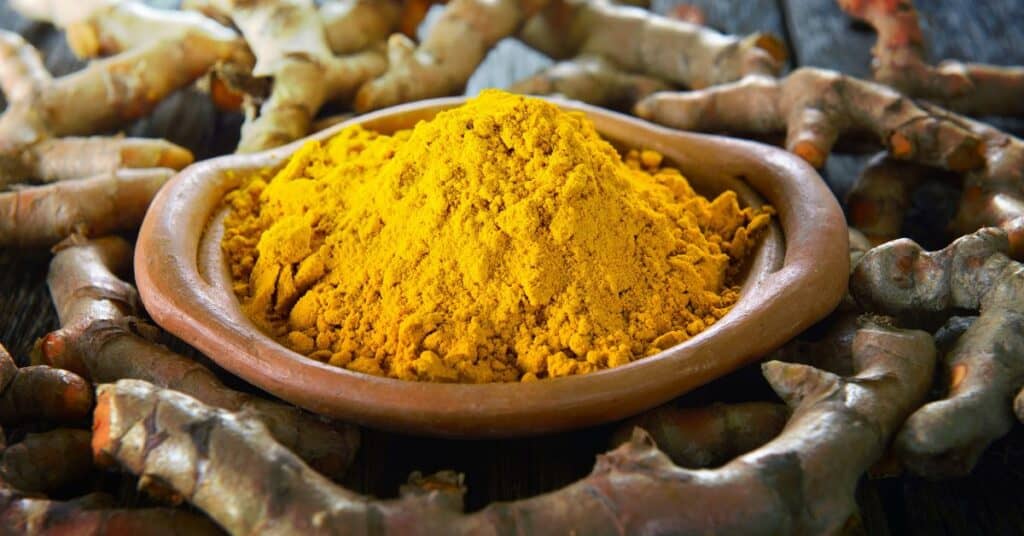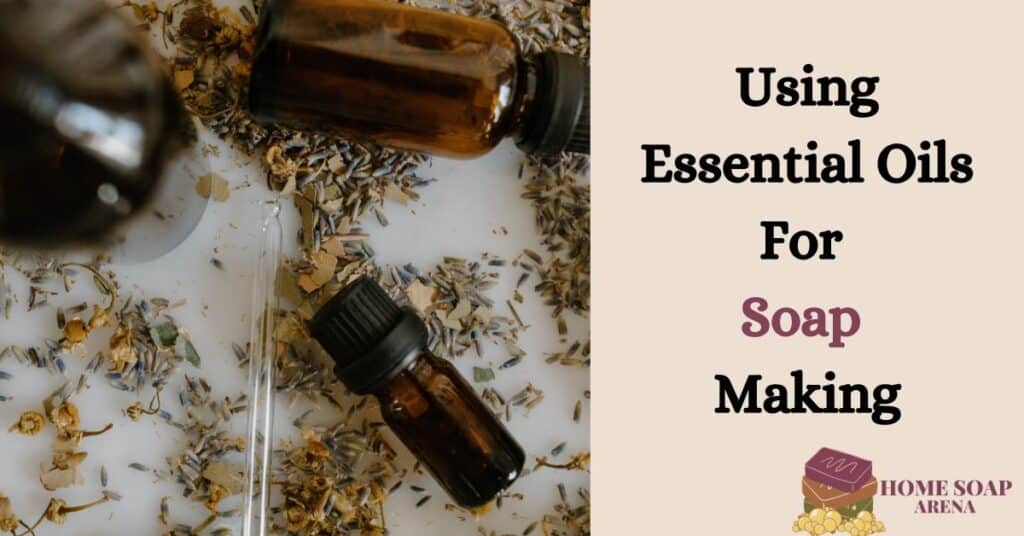Table of Contents
- What Essential Oils Go Well With Turmeric?
- What Are Essential Oil Blends For Turmeric Soaps?
- Can I Use Any Essential Oil With Turmeric For Soap Making?
- Are There Essential Oils To Avoid When Crafting Turmeric Soap?
- Conclusion
What are the essential oils for turmeric soap? Use any skin-safe essential oils that complement the turmeric soap.
Essential oils like lemon, lavender, thyme, frankincense, and rosemary, among others, will show you as you read.
Turmeric soap, known for its skin-loving properties and vibrant color, becomes even more enchanting when infused with the right essential oils.
Turmeric is a spice with many benefits for the skin, and I love turmeric soap.
In this detailed guide, I’ll explain the selection of essential oils that harmonize with turmeric, creating a soap that not only pampers the skin but also delights the senses.
Let’s Start!
What Essential Oils Go Well With Turmeric?
Different essential oils can be blended with turmeric soap. The fusion of turmeric and essential oils in soap creation celebrates nature’s gifts.
Essential oils like Frankincense, Tea Tree, Bergamot, Cardamom, Cassie, Cistus, Clary Sage, Coriander, Geranium, Ginger, Lemon, Lemongrass, Galangal, and Helichrysum
Labdanum, Lavender, Peppermint, Mimosa, Neroli, Cedarwood, Orange, Orris, Patchouli, Chamomile, Petitgrain, Sandalwood, and Ylang Ylang, etc.
These are amazing oils to add to your turmeric soap.
Additionally, Creating essential oil blends for turmeric soaps is an exciting way to enhance the skincare benefits and fragrance of the soap.
What Are Essential Oil Blends For Turmeric Soaps?
Here are some delightful essential oil blends to consider:
Balancing Blend: Lavender + Geranium + Frankincense
Benefits: This blend combines the calming properties of lavender with the floral balance of geranium and the earthy renewal of frankincense, creating a harmonious and balanced effect.
Citrus Zest Blend: Lemon + Orange + Grapefruit
Benefits: Infuse your turmeric soap with citrus’s uplifting and brightening aroma.
Lemon, orange, and grapefruit essential oils work together to add a refreshing zest to your soap.
Soothing Chamomile Blend: Chamomile + Lavender + Ylang Ylang
Benefits: Ideal for sensitive skin, this blend incorporates the gentle, soothing properties of chamomile, the calming touch of lavender, and the exotic sensuality of ylang-ylang.
Invigorating Minty Freshness: Peppermint + Eucalyptus + Tea Tree
Benefits: Revitalize your senses with this mint blend. Peppermint and eucalyptus bring an invigorating freshness, while the tea tree adds cleansing power to the soap.
Spicy Citrus Blend: Bergamot + Ginger + Lemongrass
Benefits: Combine the warmth of ginger with the citrusy notes of bergamot and lemongrass for a spicy and uplifting blend that adds a hint of exoticism to your turmeric soap.
Floral Harmony Blend: Rose + Jasmine + Neroli
Benefits: Embrace the luxurious floral notes with this blend. Rose, jasmine, and neroli create a harmonious and indulgent fragrance for a spa-like experience.
Woody Elegance Blend: Cedarwood + Sandalwood + Patchouli
Benefits: Infuse your turmeric soap with a touch of elegance. Cedarwood, sandalwood, and patchouli provide a grounding and earthy aroma for a sophisticated vibe.
Calming Lavender and Chamomile Blend: Lavender + Chamomile + Frankincense
Benefits: Use lavender, chamomile, and frankincense to achieve a calming and soothing effect. It is ideal for promoting relaxation and tranquility.
Can I Use Any Essential Oil With Turmeric For Soap Making?
Certainly! While some essential oils pair exceptionally well with turmeric, the possibilities are vast.
Experiment with different oils to find your preferred combination. Also, check if the essential oil accelerates trace or changes your soap’s color.
Are There Essential Oils To Avoid When Crafting Turmeric Soap?
While most essential oils complement turmeric, some individuals may be sensitive to specific oils.
It’s advisable to avoid oils that may cause irritation or allergic reactions, accelerate Trace, or change the soap color.
It is crucial to read the product description on the website of the essential oil you desire.
Choose essential oils that are skin-safe, stable, and compatible with turmeric. Some good options are lavender, frankincense, rosemary, thyme, and ylang ylang.
These oils have anti-inflammatory, antibacterial, and antioxidant properties that enhance the benefits of turmeric soap.
Conclusion
Turmeric soap is a natural and beneficial soap that you can make at home quickly and affordably.
It has many benefits for the skin, such as reducing inflammation, fading dark spots, and brightening the complexion.
You can customize your turmeric soap to suit your preferences and needs using natural ingredients and essential oils.



